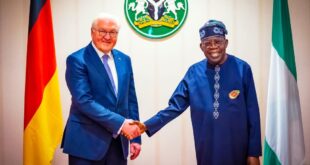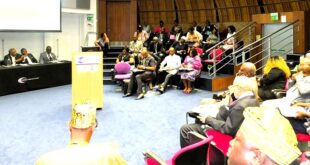An important role of the African Diaspora is promoting their countries of origin as a good destination of investment in their places of residence. A Nigerian who has taken that duty as a challenge is Germany-based Ambrose Okojie, the managing director of ABG Paulas, the company that organizes the annual Nigerian German Trade Mission and the Nigerian Business Day Potsdam.
The events bring delegations of businesspeople and politicians from Nigeria and their German counterparts together to promote trade between the two countries.
In an exclusive interview with The African Courier, Okojie talks about the challenges of promoting German investment in Nigeria and the untapped potentials for bilateral economic relations between the two countries, among other issues.
What are the objectives of the Nigerian German Trade Mission?
Okojie: The Mission pursues increased trade between Nigeria and Germany. We bring businesspeople from both countries together to explore mutually-beneficial opportunities. We also encourage German companies to invest in Nigeria especially in the areas that will increase our productive capacity.
In which areas are Germany and Nigeria currently actively trading with each other?
Within the context of our activities, we have seen active trade in the areas of industrial machinery, construction equipment and technical training.

What are the obstacles in the way of increased German-Nigerian trade?
We have problems convincing German investors that Nigeria is a safe country. Many Germans still express apprehensions about the security situation but also about the investment climate in Nigeria. However, the security situation has improved remarkably in recent time.
How do you think the image problem can be solved?
The federal and state governments in Nigeria should do more in international public relations because the problem is that of perception. More resources should be spent abroad to give the country a better image.
In which areas are there potential for increased German-Nigerian trade?
We see untapped potential in the areas of industrial equipment and technology, agriculture, oil and gas, transportation and education.
What do you expect from the Nigerian side as also from their German counterparts to promote greater trade between the two countries?
We expect a greater transfer of technology and managerial competence from the German side and more capital investment from the Nigerian side.
You have been organizing the Nigerian German Trade Mission for more than ten years now. Do you think you have been able to achieve your objectives?
We have had tremendous success in the pursuit of our objectives. However, we have also experienced some setbacks.

What problems have you faced?
Mainly, we have faced certain challenges in getting German visas for some participants from Nigeria.
Are there institutions that have been helpful to you?
Yes, I would like to use this medium to once again express our gratitude to IHK Potsdam, the Nigerian German Business Association (NGBA) Nigeria, the Government of Rivers State of Nigeria and many others for their contributions towards this Mission.
Which other institutions would you still like to support your efforts?
We would like to encourage government agencies, corporate bodies, NGOs and even individuals in Nigeria and Germany to go all out and help promote business relations between the two countries. This is because only through increased investment can we develop our economy and create jobs for the mass of the unemployed youths in the country.
 THE AFRICAN COURIER. Reporting Africa and its Diaspora! The African Courier is an international magazine published in Germany to report on Africa and the Diaspora African experience. The first issue of the bimonthly magazine appeared on the newsstands on 15 February 1998. The African Courier is a communication forum for European-African political, economic and cultural exchanges, and a voice for Africa in Europe.
THE AFRICAN COURIER. Reporting Africa and its Diaspora! The African Courier is an international magazine published in Germany to report on Africa and the Diaspora African experience. The first issue of the bimonthly magazine appeared on the newsstands on 15 February 1998. The African Courier is a communication forum for European-African political, economic and cultural exchanges, and a voice for Africa in Europe.





























